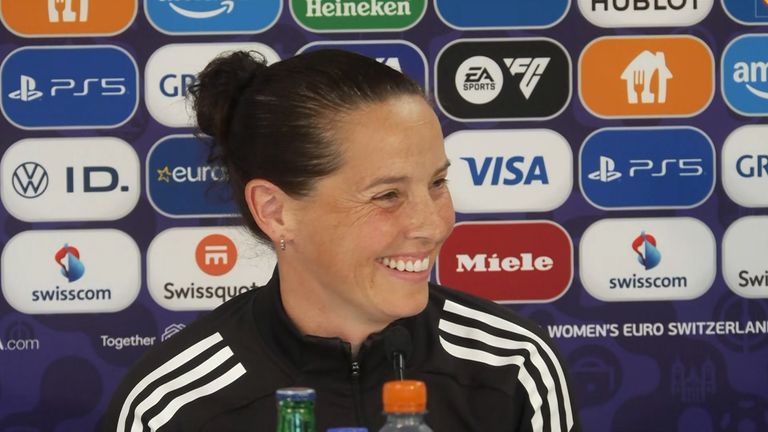'Plan to strike Iran' on agenda in Biden call with Israeli PM
Joe Biden is expected to hold a phone call with Israel's prime minister today in which the two leaders will discuss plans to strike Iran, a source familiar with the matter has said. Meanwhile, Hezbollah's deputy leader Naim Qassem has said he backs attempts to secure a truce.

More than 42,000 people killed in Gaza, says health ministry
The number of people killed by Israeli operations in Gaza has risen to 42,010, the Hamas-run health ministry has said.
A further 97,720 people had been injured, it added.
That means at least 45 deaths and 120 injuries have been recorded in the past 24 hours.
The ministry's figures do not differentiate between civilians and Hamas fighters - Israel says at least 20,000 militants have been killed.
While some Israeli officials have cast doubt on the ministry's figures, several independent groups say they have proved to be largely reliable and broadly in line with those later produced by the UN and Israel itself.
The first is a potential Israeli strike on Iran.
"It's been over a week now since Iran launched those ballistic missiles at Israel and Israel has been considering and trying to formulate what its response is going to be," Bunkall says.
"Last night, Benjamin Netanyahu met his security cabinet to try to agree what form that response should take."
Bunkall notes that there has been a bit of controversy because Mr Netanyahu blocked his defence minister, Yoav Gallant, from a US visit to meet Lloyd Austin, his American counterpart.
"One of the reasons, he said, was that he wanted to speak to President Biden on the phone. That conversation, we understand, is due to happen this afternoon," Bunkall adds.
"The Americans will be pushing for a strike that probably targets Iran's Revolutionary Guard bases and sites... in order that these tit-for-tat counterstrikes between Israel and Iran don't get bigger."
The second thing to watch is Hezbollah's support of a ceasefire deal.
The group's deputy leader said yesterday that it supported a ceasefire, saying for the first time that the end of war in Gaza would not be a pre-condition for fighting in Lebanon to stop.
"It looks like Hezbollah, who are under a lot of pressure, are now willing to entertain the idea of a ceasefire," Bunkall says.
"The question is are the Israelis? Because they are on the front foot at the moment."
Secure hostage deal or we'll stop fighting, Israeli soldiers threaten
A group of Israeli soldiers have threatened to end their military service if the government does not seek a hostage release deal.
In a letter addressed to Benjamin Netanyahu, the prime minister, and defence minister Yoav Gallant, 130 soldiers said that "continuing the war in Gaza not only delays the return of the hostages, but also endangers their lives".
"If the government does not change course immediately and work towards securing a deal to bring the hostages home, we will not be able to continue serving," they added.
"For some of us, the red line has already been crossed, and for others, it is rapidly approaching: the day when, with broken hearts, we will stop reporting for service."
The group includes both reserve and regular soldiers, some of whom have served in Gaza and on Israel's northern border since last year's 7 October Hamas attacks.
Militants kidnapped 251 people during the incursion, taking them to Gaza, where it is thought 97 of them remain.
IDF: 185 Hezbollah targets hit in 24 hours
The Israeli military says it has hit around 185 Hezbollah targets in Lebanon in the past day.
Soldiers had "dismantled" launch pads that "posed a threat" to northern Israel and located weapons, it added.
Hezbollah militants had also been killed in "close quarter encounters" and aerial strikes.
In Gaza, the military said its operation against Hamas was still taking place, with "dozens" of fighters killed in the past 24 hours.
Weapons, including grenades and AK-47 rifles, had been destroyed, along with "infrastructure sites" and rocket launchers, it added.
Further escalation in Middle East 'very, very likely'
Further escalation in the ongoing conflicts in the Middle East is "very, very likely", a former MP and security analyst has said.
Speaking to Sky News this morning, Tobias Ellwood said the situation in the region was "more dangerous" than a year ago.
"I mean, today Israel is battling not just on one, but three fronts with further escalation, not just possible, but I think, on current trajectory very, very likely indeed," he said.
He added that Israel has "succeeded in battering its enemies" in Gaza, but at a "huge price" to the enclave's infrastructure.
In Lebanon, Mr Ellwood said Israel had acted on "impressive intelligence gathering" to eliminate "swathes" of Hezbollah's military and political leaders.
"Now it is poised to hit Iran with a barrage of missiles, probably aiming at ports or maybe infrastructure, even that nuclear programme," he added.
"It's naive to assume that a deadlier strike, or a series of strikes on Iran will alter Tehran's behaviour, so the big question for Israel remains how are those successes and the gains translated into long term stability for Israel and indeed the region."
How might Israel respond to Iran's attack?
As we reported in our 6.38 post, Joe Biden and Benjamin Netanyahu are due to speak today, and one topic of discussion will reportedly be how Israel plans to respond to Iran's attack on the country last week.
There are concerns Israel could attempt to target Iranian energy facilities or its nuclear sites in the retaliatory strikes.
Military analyst Colonel Simon Diggins has told Sky News the US had sent a "clear message" that targeting Iranian nuclear facilities would not be acceptable.
He said Iran had also declared attacks on its oil refineries would also been seen as a "red line".
An Israeli response of that nature could make it "very easy" for Iran to target similar refineries in other places.
So where could Israel target?
"At the moment, we think that the targeting will probably be Iranian revolutionary guard corps or intelligence facilities, primarily military facilities that they will go for," Colonel Diggins said, adding that would be a similar "attack pattern" to Iran's strike on Israel.
He added that Israel was facing an element of pressure to respond, but that the country's wouldn't be "deflected from conducting an attack".
"They did say very early on that they would attack at a time and place of their own choosing, and not necessarily feel the need to respond absolutely immediately to it," he said.
"They could have been consulting with the Americans as to what they should or should not to do, and Americans have fairly strong views on not allowing the situation to escalate any further already has."
Smoke rises above Beirut
Smoke plumes were seen rising over Beirut in Lebanon this morning.
The Israeli military said last night that strikes in the country over the past 24 hours had killed 50 Hezbollah fighters, including six senior commanders.
It claimed about 180 rockets were launched from Lebanon toward northern Israel yesterday, with most intercepted.
'Thinking with our heads and wombs' - Mums of Israeli soldiers at war
In the 1990s, Anat Saban joined a movement of mothers that rose up to protest against their sons being sent to fight in Israel's first war against Hezbollah in Lebanon.
"We were accused of thinking from our womb," she told Sky News. Her son served in Lebanon from 1996 to 1997.
"[But] I think that our advantage is that on top of thinking from our heads, we think from our womb."
Peaceful demonstrations by the so-called Four Mothers group helped to pressure the then government finally to withdraw Israeli troops from their northern neighbour in 2000.
More than two decades later, though, with boots back on the ground inside Lebanon, Anat, aged 76, says she is wary about the mission and worried about their safety.
But she is no longer completely opposed to the war, after the 7 October atrocities by Hamas in southern Israel last year left her terrified that Hezbollah could launch the same kind of cross-border rampage where she lives in the north - unless the militants are stopped.
"I'm afraid they'll come from tunnels, with parachutes, something that's beyond our control," she said. "The fear is so deep that I don't know if I can recover from it."
Biden to hold call with Israeli PM to discuss 'plans to strike Iran'
Joe Biden is expected to hold a phone call with Israel's prime minister today where the two leaders will discuss plans to strike Iran, a person familiar with the matter has told Reuters.
The US president will be hoping to weigh in on whether Benjamin Netanyahu's decided course of action is appropriate, a separate source said.
The Middle East has been on edge waiting for Israel to respond to last week's missile attack from Iran.
The attack, which Tehran said was in retaliation for Israel's military escalation in Lebanon, ultimately killed no one in Israel, and Washington called it ineffective.
Mr Netanyahu has vowed that Iran will pay for the strike, while Iranian officials have said any retaliation will be met with "vast destruction".
On Friday, Mr Biden said he would think about alternatives to striking Iranian oil fields if he was in Israel's shoes.
Israeli soldiers 'targeted by Hezbollah militants'
Hezbollah says its fighters have targeted Israeli troops near a Lebanese border village.
The Iran-backed militant group said the troops were attacked with artillery shells and rockets near Labbouneh.
The Israel Defence Forces said one soldier had been injured during combat in southern Lebanon this morning.
Two other military personnel were "severely injured" in combat in the same area yesterday, it added.
It said all three soldiers had been evacuated to a hospital.
It comes a day after Israel said it had killed two successors to Hezbollah's slain leader, Hassan Nasrallah.
-SKY NEWS






